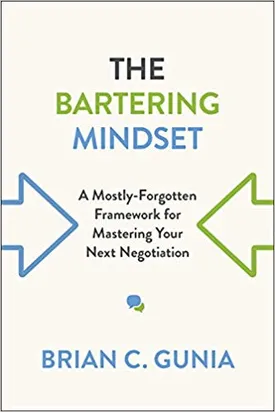The Bartering Mindset: A Mostly Forgotten Framework for Mastering Your Next Negotiation by Brian Gunia
The bartering mindset is an overlooked framework in the negotiation process. It requires a different type of thinking to be successful, as it is not based on the usual tactics that most people employ. Instead, it focuses on understanding the different motivations of each party and trading something of value in order to reach an agreement.
In his book, "The Bartering Mindset," Brian Gunia explains that the traditional negotiation process is not always the best way to get what you want. Most people are trained to negotiate using the most aggressive tactics possible in order to come away with the best deal. This often leads to antagonizing the other person, creating resentment and damaging relationships. Gunia suggests that if you want to come away with the best deal, you need to understand the other person's wants and needs, and develop strategies that benefit both parties.
By shifting the focus of the negotiation away from getting the best advantage and instead seeking mutual benefit, you can create an atmosphere of mutual trust and understanding. Gunia explains that the key is to understand each other's value in the negotiation and to use that knowledge to craft a deal that both sides benefit from.
Bartering mindset focuses on understanding the various motivations of each party and trading something of value in order to reach an agreement. It requires the negotiation participants to think hard and carefully about what they can give and what they can get from the negotiation. This includes an understanding of the other party's situation, such as the need for quick resolution or a desire for a particular product or service. Gunia also explains how to use an understanding of the other party’s needs to craft a solution that meets both parties’ objectives.
To master the bartering mindset, Gunia suggests a number of strategies. These include creating a rapport with the other party by listening carefully and asking thoughtful questions; ensuring that everyone can speak their mind; understanding the interests and objectives of each party; identifying areas of shared value; and setting mutual ground rules. Additionally, he explains the importance of taking notes, and even suggests writing down the key points of the negotiation in order to maintain clarity throughout.
The bartering mindset is a valuable framework for mastering negotiations. It allows participants to look beyond simply getting the best deal and focuses on creating a solution that mutually benefits both parties. Gunia's book offers a comprehensive overview of the bartering mindset, providing a wealth of information and strategies for mastering future negotiations. By following these steps, negotiators can create an atmosphere of mutual trust and understanding and reach an agreement that is beneficial to all parties.

